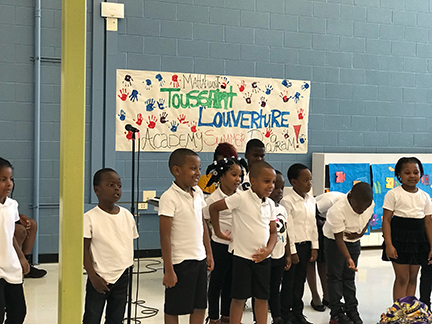

I know I can (I know I can)
Be what I wanna be (be what I wanna be)
If I work hard at it (if I work hard at it)
I’ll be where I wanna be (I’ll be where I wanna be)
–Nas, “I Can”
Where can you find dual language English/Haitian Creole instruction for students in first and second grades? At Mattahunt’s Toussaint L’Ouverture Academy (TLA), a Boston public elementary school. Founded in 2017, TLA is the nation’s first early learning English–Haitian Creole dual language program. The U.S. Department of Education Office of English Language Acquisition (OELA) lists Haitian Creole as the sixth most common language of K–12 English learners in the U.S. (U.S. Department of Education, 2019). After two decades of advocacy and planning by dedicated community members of Haitian descent, educators, politicians, and other stakeholders were overjoyed when the school finally enrolled its first class of students.
The school is named after an enslaved Haitian, later turned revolutionary, Toussaint L’Ouverture (1743–1803), who successfully led a revolt which resulted in Haiti’s independence from France. The program’s mission is to educate and support the students in becoming biliterate, bilingual, and bicultural citizens. As Beavers (2020) stated, “Language contributes to the ways in which individuals live, survive, and lead.” The principal, Mr. Walter Henderson, and assistant principal, Ms. Joelle Gamere, along with a dedicated teaching staff, have worked diligently to ensure the program is implemented as intended and maintains the highest levels of academic integrity. The school is located in Mattapan, a neighborhood in Boston, Massachusetts, which is home to a large Haitian immigrant population.
Going Back to Move Forward
The Mattahunt School initially faced closure due to a number of factors but ultimately was restructured, rebranded, and reopened to include the Haitian Creole–English dual language program. During the first year after reopening, the school leaders and a small group of community members were awarded a grant to research early literacy practices in Haiti. That research entailed several school visits, including one to a school on an island off the coast of Haiti. The dedication to education observed by Mr. Henderson’s team affirmed their commitment to creating a school that would teach the students Haitian Creole, their mother tongue, not French, the language of Haiti’s colonizer.
During their trip they met with a number of educators, Ministry of Education personnel, curriculum writers, tour guides, and local residents. What was most evident to them was the desire for education for all but especially for the youngest citizens. The leadership team have been tenacious in assuring the Toussaint L’Ouverture Academy is academically rigorous and teaches and assesses in both English and Haitian Creole. Despite challenges with securing curriculum, scope and sequence, and assessments in Haitian Creole, the school leaders have been steadfast in their approach to supporting the teachers’ professional learning, working closely with Haitian community organizations and advocating for continued support of the dual language program.
The students are performing well both academically and socially. The teachers and consultants are credited for putting in countless hours creating the entire curriculum and transadapting it into Haitian Creole.
Academic Achievement and Cultural Pride
Students who are enrolled in the prekindergarten Haitian dual language program tend to outperform their monolingual peers in letter recognition in English and Haitian Creole. Another highlight is that native Haitian Creole speakers in the dual language program are acquiring English at a faster rate than native speakers who are enrolled in a sheltered English immersion (SEI) program. Also, the social–emotional wellness, self-esteem, and confidence of the students are healthy and strong due to the consistent validation of their culture.
Currently the Toussaint L’Ouverture Academy enrolls approximately 60 students ages four to eight in grades K–2, with 22 students projected to enroll next school year. The program has added a grade level each year to accommodate its students. There are seven teachers in the English and Haitian Creole program. In May, the students and staff participated in the district’s Virtual Haitian Heritage Month Celebration. The month is dedicated to celebrating the rich culture of Haiti and the many contributions Haitians and Haitian Americans have made to the community. The students’ artwork; dancing; science, technology, engineering, and math (STEM) projects; and dual language speaking abilities were featured.
In addition, parents gave testimonials about why they enrolled their children in the program and how it has been beneficial to their children. This school is educating our nation’s next generation of biliterate and bilingual citizens, opening up a world of academic and economic opportunities for them. Appropriately, the school’s mascot is an owl, a bird that symbolizes intelligence and wisdom. TLA is serving as a model for others wanting to establish native-language instruction and English for the communities they serve. The Toussaint L’Ouverture Academy embodies linguistic social justice by elevating the Haitian Creole language and providing students with the opportunity to learn English in an environment that dignifies their home language and culture.
References
Beavers, J. (2020, October). “Questions to Ask Ourselves.” Pass the Mic series. Language Magazine. www.languagemagazine.com/2020/11/26/questions-to-ask-ourselves
U.S. Department of Education, National Center for Education Statistics. (2019, October). “Top Ten Languages Spoken by English Learners (ELs) in the United States.” https://ncela.ed.gov/files/fast_facts/olea-top-languages-fact-sheet-20191021-508.pdf
Ayanna Cooper, EdD, is an advocate and writer and the owner of A. Cooper Consulting. She is author of And Justice for ELs: A Leader’s Guide to Creating and Sustaining Equitable Schools (Corwin). She is the editor for Language Magazine’s Pass the Mic, a series that highlights experiences of traditionally marginalized educators and the students they serve.





